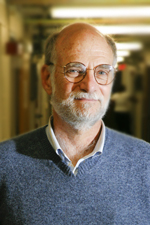Michael Rosbash wins 2009 Gruber Prize in Neuroscience
Biologist shares $500K award with Jeff Hall and Michael Young for research on circadian rhythms of Drosophila

Biologist Michael Rosbash
The Peter and Patricia Gruber Foundation announced today that its 2009 Neuroscience Prize will be awarded to Michael Rosbash, professor and director of the National Center for Behavioral Genomics at Brandeis. Rosbash will share the award with his longtime collaborator Jeffrey Hall, now professor of neurogenetics at the University of Maine, but a Brandeis faculty member until 2008, and Michael Young, professor and head of the Laboratory of Genetics at Rockefeller University.
On October 18, at the annual meeting of the Society for Neuroscience in Chicago, Illinois, these three distinguished scientists will receive this prestigious international award for their groundbreaking discoveries of the molecular mechanisms that control circadian (daily) rhythms in the nervous system. Their research was the first to establish a simple relationship between single genes and a complex behavior.
“The combined discoveries of Jeffrey Hall, Michael Rosbash and Michael Young are stunning in their creativity, breadth and significance. These researchers began with a complicated animal behavior, established that single genes can define specific aspects of this behavior and determined mechanistically how such genes act,” says H. Robert Horvitz, David H. Koch Professor of Biology at MIT. “Hall, Rosbash and Young have not only defined the genetic, molecular and biochemical bases of a complex animal behavior but have also established a paradigm for how such analyses should be done.”
“It’s very gratifying, and flattering to be recognized with such a prestigious award and by the research community,” said Rosbash.
Before Hall, Rosbash, and Young published their seminal studies on the molecular underpinnings of the circadian rhythms of the fruit fly, Drosophila melanogaster, many people questioned whether a compelling relationship between genes and behavior could be established. By the early 1970s, the first fruit fly mutants with altered circadian rest/active cycles had been identified— making a case for the genetic control of behavior—but the mechanism behind the phenomenon remained unknown. What was running the internal biological clock in Drosophila?
In 1984 came the first breakthrough. That year Hall and Rosbash at Brandeis, and Young, working at Rockefeller University, simultaneously cloned the period (per) gene of Drosophila. That pivotal discovery led to subsequent studies from all three labs that eventually unmasked the general molecular mechanism for circadian clocks: a transcriptional feedback loop that oscillates during the 24-hour cycle.
Hall and Rosbash demonstrated, for example, that per gene products exhibit oscillations for their concentrations and that during a daily cycle the per protein represses transcription of the very gene that specifies that “final” product. (Transcription is a gene’s ability to copy its DNA sequence into messenger RNA, a necessary step for translating the gene into a protein that performs a specialized function in the cell). Young identified per’s partner gene, timeless (tim), and then showed that when these two genes’ protein products (PER and TIM) reach certain levels, they bind together in the cell’s cytoplasm and are transported back into the nucleus, where primarily PER shuts down the genes that made them. After a few hours, the proteins degrade, the genes start up again—and the cycle begins anew.
As Hall, Rosbash, and Young continued their research, the fundamental workings of this complex feedback system came into even sharper focus. They discovered other genes and protein products that play critical roles in regulating the loop. They found that mutations affecting any of these genes had effects on Drosophila’s molecular rhythms—and on its behavior. They also identified how certain stimuli, most notably the light-dark cycle, help regulate the feedback loop in order to reset the clock everyday to operate in synch with natural environmental cycles (a key and universal feature of daily rhythms).
When other researchers investigated the clock mechanisms in mammals, they found them to be strongly analogous to what Hall, Rosbash, and Young had found in Drosophila. Thus, the uncovering of the mechanism in the fruit fly—a tour de force of genetics and molecular biology—has paved the way for the study of human circadian genetics.
“Practically all biological creatures thus display a circadian rhythm, whether fruit fly or man, as some species are active during night and others during daytime. This astounding ability depends on an intricate molecular mechanism that, once developed, has been conserved throughout evolution,” says Sten Grillner, Director of the Nobel Institute for Neurophysiology at the Karolinska Institutet. “To reset the biological clock takes many days, as all intercontinental travelers are forced to experience - for shift-workers it is more serious, it creates stress and fatigue that over many years can lead to harmful medical conditions.”
The official citation reads:
The Peter and Patricia Gruber Foundation proudly presents the 2009 Neuroscience Prize to Jeffrey Hall, Michael Rosbash, and Michael Young for their pioneering discoveries of molecular mechanisms that control circadian rhythms in the nervous system. These investigators established that in the fruit fly Drosophila melanogaster circadian rhythms are driven by a transcriptional feedback loop that controls the expression of the period gene. They discovered a set of interacting genes that control this process, including the light-sensing protein that establishes circadian rhythms in response to the day-night light cycle. Subsequent work by others demonstrated that these findings apply broadly to both invertebrates and vertebrates and that a mutation in the human counterpart of the period gene causes a human circadian sleep disorder. These discoveries reveal a striking solution to the problem of how genes control a higher-order behavior.
The Gruber International Prize Program honors contemporary individuals in the fields of cosmology, genetics, neuroscience, justice and women’s rights, whose groundbreaking work provides new models that inspire and enable fundamental shifts in knowledge and culture.





